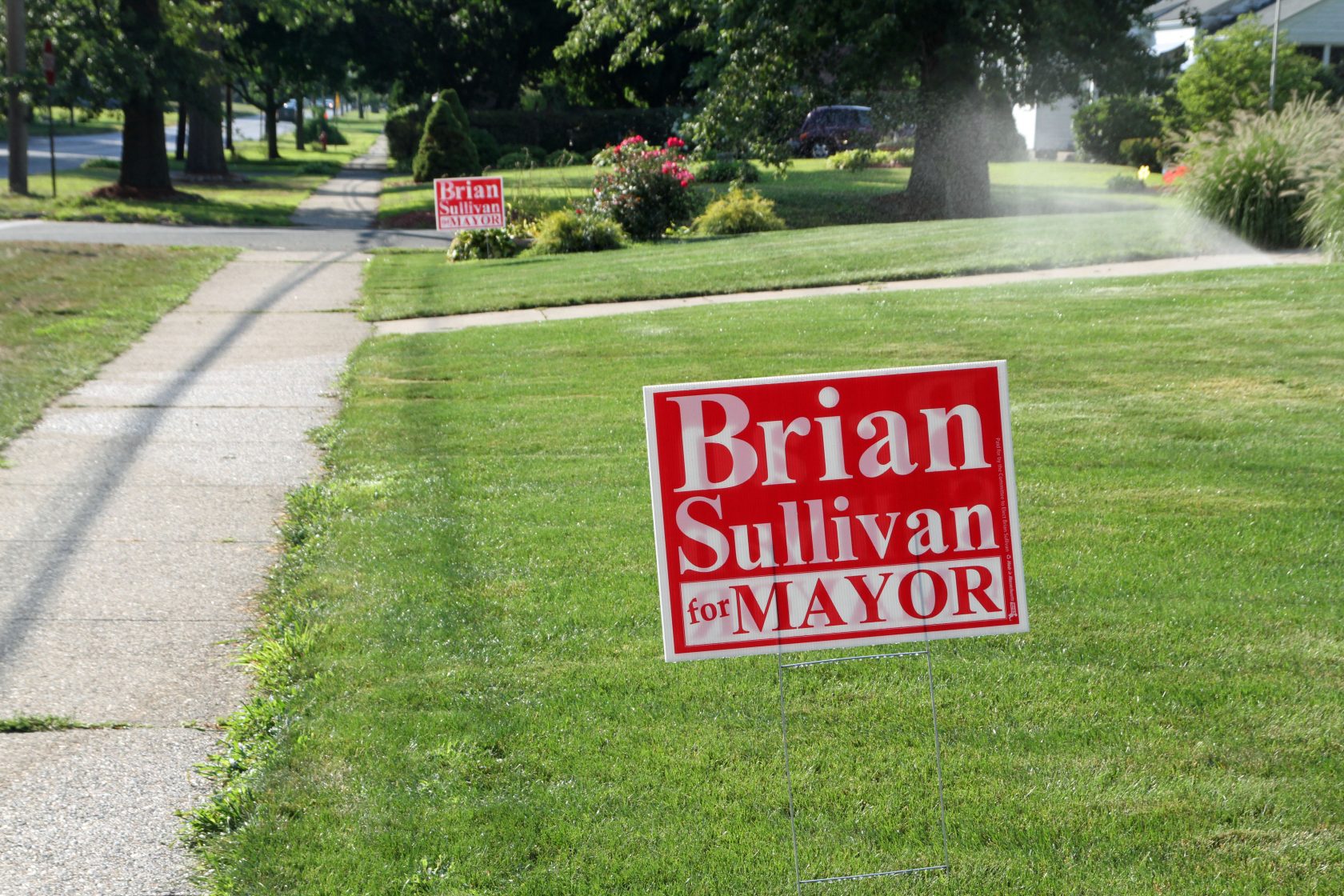WESTFIELD – More than fireworks lit up the city Sunday night as one mayoral candidate charged the other with violating city zoning codes by erecting campaign signs along the approaches to Stanley Park Sunday.
Mayoral candidate Michael L. Roeder posted a Facebook page charging mayoral candidate Brian P. Sullivan with jumping the gun by posting campaign signs Sunday, more than 60 days prior to the Nov. 3 general election, a violation of zoning code, Article VIII, section 8-10.3, paragraph 3 which pertains to temporary signs.
“I was disappointed to say the least but several supporters were irate since it is illegal under city ordinance to put up political signs before Sept. 3,” Roeder stated in the post. “These signs were a calculated, arrogant attempt on the part of the Sullivan campaign team to ignore the law in order to gain an advantage in this campaign. It was blatantly illegal and they knew it.”
Sullivan said Tuesday morning that his campaign had planned to do a “stand out” in which campaign workers hold signs at the Highland Elementary School on Western Avenue. Campaign workers holding a sign is allowed at any time under the current zoning and an activity which has been going on at events downtown for several months, including the concerts at Park Square Green.
Residents who support his mayoral campaign and who live in that area of Stanley Park requested signs they could post in their yards, while others were issued signs for the original fireworks event slated for June 27.
“We were doing a visibility program around Stanley Park because of the number of people attending the fireworks,” Sullivan said. “The signs were taken down, by my father and volunteers, Monday morning. This kind of activity has been going on for years at events like the air shows.”
“I don’t feel that it violated the sign ordinance because it was a visibility event,” Sullivan said. “I did call Mike’s house when I heard he had a problem with this and left a voice mail to call me so we could talk man to man, but he has yet to respond to my invitation and instead posted something on social media.”
“My campaign will be about issues, things that will move the city forward,” Sullivan said. “I’m not going to get involved in a social media fight.”
Zoning complaints are sent, in writing, to the Building Department, investigated, and if there is indeed a violation, the person responsible is told to rectify the violation, in this case by removing lawn signs, until the allowed period which begins 60 days prior to the general election.
Ironically, if the nomination papers submitted by Harold Alan Phelps had been certified, a preliminary mayoral election would have been slated for Sept. 22, 2015 and the Sullivan campaign signs would have been allowed under the current zoning regulation.
Phelps “attempted to submit his papers, but he did not have an ID that showed his current address, so his papers could not be notarized, also he did not amend his papers to show his new, current address, therefore, we could not accept his papers,” City Clerk Karen Fanion said in a statement released on Aug. 11, the deadline for returning nomination papers. “And even if he did have the proper ID he only had 49 signatures.”
The Planning Board voted at its July 21 meeting to continue the public hearing on a proposed change to the city’s zoning ordinance controlling temporary signs after new language was submitted by At-large Councilor Dan Allie.
Allie and Principal Planner Jay Vinskey amended the original language on July 21 to reflect a US Supreme Court ruling on the case of Clyde Reed, pastor of the Good News Community Church versus the Town of Gilbert, Arizona, where the court found that the town treats political campaign “signs less favorably than ideological signs.”
The City Council initiated its own public hearing on the zoning amendment at its July 2, 2015 session based upon the original amendment proposed by Allie, but will now have to consider the new language resulting from the court decision.
Vinskey said the new language is intended to bring the city’s temporary sign ordinance into line with the Supreme Court 35-page decision.
The ordinance cannot contain “content based restrictions” or deprive property owners of their right to post temporary signs, including political campaign signs, Vinskey said.
“The July 21 version is to make the ordinance more constitutional than what is currently on the books,” Vinskey said.


